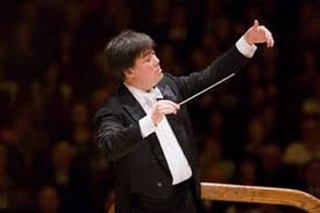|
Back
1911: A Musical Tribute New York
Avery Fisher Hall, Lincoln Center
05/06/2015 -
Igor Stravinsky: Petrushka; (Original 1911 version)
Maurice Ravel: Valses nobles et sentimentales
Richard Strauss: Suite from Der Rosenkavalier, opus 59 (Revised by Alan Gilbert)
New York Philharmonic Orchestra, Alan Gilbert (Musical Director/Conductor)

A. Gilbert (© alangilbert.com)
Last night’s NY Phil concert was a tripartite tribute. First, to retired employees of the Philharmonic corporation who were honored and given a buffet dinner. Second, to Alan Gilbert and the orchestra, welcoming them home after a reportedly successful European tour. (And as a gift, letting them repeat works they played earlier this year.)
And the third tribute?
One Nine One One: 1911!
Yes, the year 1911, the year when all when all three pieces were composed.
And it was quite a year. America was thriving, Europe was basking, England’s Pax Brittanica would make “their” Africa a place of civilization. Even in China, the last Emperor had left the throne in 1911. Sun Yat-sen had proclaimed the Middle Kingdom to be a Republic, free of strife and warlords, and a land of beneficence for eternity.
In 1911, the people’s of the world would shake hands, enmities would be forgotten, a truly open hearted earth would belong to us evermore.
(Yes? No? I’m wrong?? Well...okay....so I’m not a prophet. Let’s go on anyhow.)
All three pieces last night were written in 1911, all three works were written by composers whose lands had been at war with each other in the last century but who now promised peace. And while Russia had experienced a few political burps earlier in the century, and while France and “Prussia” didn’t quite trust each other after their Franco-Prussian war, everything seemed right on balance.
Even the music was tranquil, with hardly an iota of tragedy. In fact, the only death one could find was for a puppet made of wood and strings. Not to be taken seriously.
In fact, the composers were perhaps so upset by the earthly equilibria that they had to go back in history to find their inspiration. Ravel based his Valses nobles et sentimentales on two groups of piano piece written by Franz Schubert 90 years before. Richard Strauss’s Rosenkavalier dealt not with Italian-opera melodramatics but with the Classical Age of Mozart. Even Stravinsky with his so-called “music of the future”, had gone back 80 years to a Russian festival.
This was the original Petrushka, a ballet written in 1911 with a sumptuous orchestra. And while great art is forever, the International Copyright Association didn’t quite go along with that. The Russian Petrushka was subject to Soviet copyright laws. Thus, the Petrushka we usually hear today is with a smaller orchestra. The 1911 version was more glorious, more exciting.
And Mr. Gilbert, savoring his recent tour, let the pictures unfold themselves, from the milling crowds at the Shrovetide Fair to the dances, to the tragedy of the poor eponymous puppet, a parody of Pagliacci, the clown dying for unrequited love.
If the orchestra was good, the soloists were so good that one sometimes ignored the ensembles for the individual artists. A special set of hosannas for snare drums and solo violins. But especially for Eric Huebner, whose glorious piano solos were overwhelming. And for Matthew Muckey, a trumpet player who simply let the clarion calls effortlessly hang over Avery Fisher Hall.
The second work, Ravel’s Valses nobles et sentimentales in its orchestrated form, was also set as a ballet, but the seven-odd waltzes never really succeeded in that form. Yet when listening to the piece, one realizes just how sensitive, how utterly perfect Ravel’s orchestration could be. We get that in Daphnis and La Valse, of course. But this work, written before the auto accident which made Ravel’s later works a bit forced, was an untrammeled joy.
>BR />
Finally, Mr. Gilbert presented Richard Strauss’s 1911 gift to the world, Rosenkavalier. Strauss had arranged the waltzes, but an anonymous figure re-arranged the vocal music to orchestral form. And last year a far-from-anonymous Alan Gilbert revised this for more operatic realism. Instead of ending with the great sweeping pre-Johann Straussian waltz, Mr. Gilbert took the literal final pages of the opera, made the last words into orchestral colors, and, like the opera, allowed the orchestral flambeaux to be extinguished.
Extinguished the way the peace of 1911 would disappear two years later with a single shot in Sarajevo, introducing the unending (and unendable?) war which we have today.
Yes, 1911 was fine while it lasted. But all good things–even musical illusions–must come to an end, a glorious prelude to the goriest future.
Harry Rolnick
|